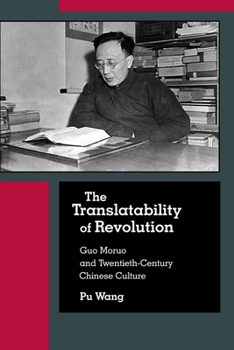The Translatability of Revolution: Guo Moruo and Twentieth-Century Chinese Culture
(Book #415 in the Harvard East Asian Monographs Series)
The first comprehensive study of the lifework of Guo Moruo (1892-1978) in English, this book explores the dynamics of translation, revolution, and historical imagination in twentieth-century Chinese culture. Guo was a romantic writer who eventually became Mao Zedong's last poetic interlocutor; a Marxist historian who evolved into the inaugural president of China's Academy of Sciences; and a leftist politician who devoted almost three decades to translating Goethe's Faust . His career, embedded in China's revolutionary century, has generated more controversy than admiration. Recent scholarship has scarcely treated his oeuvre as a whole, much less touched upon his role as a translator. Leaping between different genres of Guo's works, and engaging many other writers' texts, The Translatability of Revolution confronts two issues of revolutionary cultural politics: translation and historical interpretation. Part 1 focuses on the translingual making of China's revolutionary culture, especially Guo's translation of Faust as a "development of Zeitgeist." Part 2 deals with Guo's rewritings of antiquity in lyrical, dramatic, and historiographical-paleographical forms, including his vernacular translation of classical Chinese poetry. Interrogating the relationship between translation and historical imagination--within revolutionary cultural practice--this book finds a transcoding of different historical conjunctures into "now-time," saturated with possibilities and tensions.
Format:Hardcover
Language:English
ISBN:0674987187
ISBN13:9780674987180
Release Date:August 2018
Publisher:Harvard University Press
Length:352 Pages
Weight:1.30 lbs.
Dimensions:1.2" x 5.8" x 9.1"
Customer Reviews
0 rating





